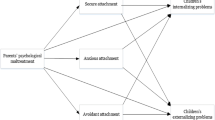Abstract
The present study aims to examine the relationship between attachment styles, parenting styles of students’ parents, and students’ depression. One hundred and twenty-two university students were selected through random sampling from a total population of 845 graduate students at Zanjan University and were given the Diana Baumrind Parenting Style and Collins and Reid Attachment Style (RAAS) questionnaires and the Beck Depression Inventory. The results of the study demonstrated a significant, negative relationship between parents’ authoritative parenting style and students’ depression; a similar pattern was also seen between secure and ambivalent parents’ attachment style and students’ depression. On the other hand, there was a positive and significant relationship between parents’ permissive and authoritarian parenting style and students’ depression. There was also a positive and significant relationship between parents’ avoidant attachment and students’ depression.
Similar content being viewed by others
References
Alizadeh, H., & Andries, C. (2002). Interaction of parenting styles and attention deficit hyperactivity disorder in Iranian parents. Child and Family Behavior Therary, 24(3), 32–52.
Amani, R. (2016). Mother-infant attachment styles as a predictor of aggression. Journal of Midwifery and. Reproductive Health, 4(1), 506–512.
Baumrind, D. (1967). Effects of authoritative control on child behavior. Child Development, 37(4), 887–907.
Beck, A. T. (1988). Psychometric properties of the Beck Depression Inventory: twenty-five years of evaluation. Clinical Psychology Review, 8(1), 77–100. doi:10.1016/0272-7358(88)90050-5.
Berg, L. (2010). Developmental psychology of adolescence to the end of life. Volume II. Translation Seyyed Mohammad Yahya (Eighth ed.). Tehran: Arasbaran publications.
Bowlby, J. (1969). Attachment and loss: attachment (Vol. Vol 1). New York, NY: Basic Books.
Bowlby, J. (1980). Attachment and loss: loss, sadness and depression (Vol. Vol 3). New York, NY: Basic Books.
Collins, N. L., Cooper, L., Albino, A., & Allard, L. (2002). Psychosocial vulnerability from adolescence to adulthood: a prospective study of attachment style differences in relationship functioning and partner choice. Journal of Personality, 70(6), 965–1007.
Collins, N. L., & Read, S. J. (1990). Adult attachment, working models, and relationship quality in dating couples. Journal of Personality and Social Psychology, 54, 644–663.
Fang, P. M. (2004). The relation between parenting style and Chinese mother-child attachment security: Mediator and moderator effects. Unpublished doctoral dissertation, University of Southern California.
Heibati (2002). Investigating parenting styles and their relationship with methods of coping with stress among male and female high school third graders in Razghan Town. Unpublished MA Thesis, Shiraz University, Shiraz, Iran, 130–145. (In Persian).
Irons, C., Gilbert, P., Baldwin, M. W., Baccus, J. R., & Palmer, M. (2006). Parental recall, attachment relating and self-attacking/self-reassurance: their relationship with depression. British Journal of Clinical Psychology, 45(3), 297–308.
Karavasilis, L., Doyle, A. B., & Markiewicz. (2003). Associations between parenting style and attachment to mother in middle childhood and adolescence. International Journal of Behavioral Development, 27, 153–164.
Kochanska, G. (1993). Towards a synthesis of parental socialisation and child temperament in early development of conscience. Child Development, 64, 325–347.
Pellerin, L. A. (2005). Applying Baumrind’s parenting typology to high schools. Journal of Social Science, 34, 283–303.
Peterman, D. (2005). Adolescents raised by their grandmothers: perceptions of parenting style and attachment representation. Dissertation for degree of Doctor of Philosophy in nursing: Georgia State University.
Silk, J., Morris, A., Kanaya, T., & Steinberg, L. (2003). Psychological control and autonomy granting: opposite ends of a continuum or distinct constructs? Journal of Research on Adolescence, 31(1), 113–128.
Wilhelm, K., Gillis, I., & Parker, G. (2016). Parental bonding and adult attachment style: the relationship between four category models. International Journal Women’s Health and Wellness, 2(1), 1–7.
Author information
Authors and Affiliations
Corresponding author
Rights and permissions
About this article
Cite this article
Ebrahimi, L., Amiri, M., Mohamadlou, M. et al. Attachment Styles, Parenting Styles, and Depression. Int J Ment Health Addiction 15, 1064–1068 (2017). https://doi.org/10.1007/s11469-017-9770-y
Published:
Issue Date:
DOI: https://doi.org/10.1007/s11469-017-9770-y




